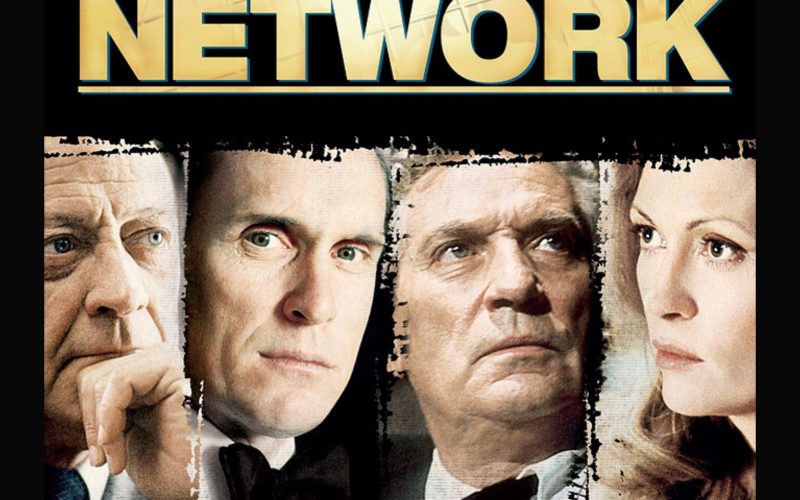Network (1976).
“This was the story of Howard Beale…”
Why write about Network, a film made some 45 years ago? Why now? Well now more than ever, in this age dominated by the likes of Facebook, Twitter and the like, humanity is influenced more than it ever has been by the media, and in particular it’s current evolutionary form, social media. Sidney Lumet’s critically acclaimed 1976 film casts a burning hot spotlight on the media of the time and the critique it makes of our slavish addiction to the stuff we’re fed on a daily basis from news outlets both printed and televised is as relevant now as it was upon the film’s release.
Network was nominated for 10 Oscars and bagged four including Best Actor for lead Peter Finch. It tells the tale of some shameful individual and corporate greed where one ageing TV anchorman’s frustration and depression is exploited for increased viewing figures. Peter Finch plays the eponymous Howard Beale, a self appointed “angry prophet denouncing the hypocrisies of our times”.
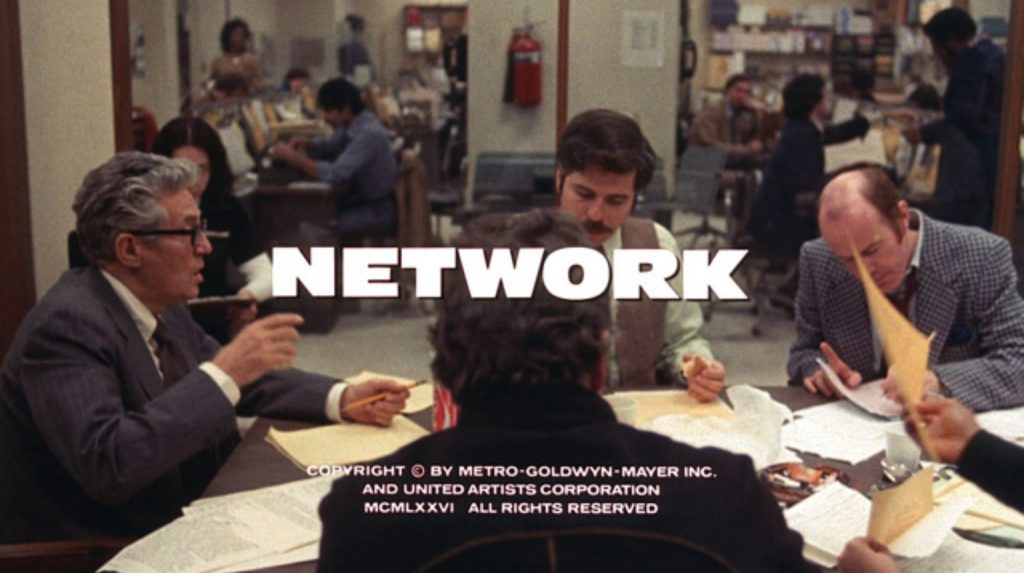
Howard Beale’s superbly written, grandstanding speech about the power of television will remain prescient as long as the media is an entity in whatever form the technology of the time dictates. Following his spectacular onscreen breakdown and equally spectacular public resurrection, Beale’s newfound evangelical power is shown in full effect and showcases what’s best about Network‘s, for the most part, phenomenal script. Beale hammers home to the audience the fact that they are wholly beholden to whatever “truths” the news and media in general tells them. Now, in 2021, more than ever, Howard Beale’s words ring true. It’s an important message that we never take for granted what the news reports, even if what we’re being told has a high degree of truth to it, it’s rarely, if ever, reported without some degree of subjective bias. Unsurprisingly the film won Paddy Chayefsky an Oscar for best screenplay.
The now famous scene where Beale utters what would become the film’s most oft-quoted line, “I’m mad as hell and I’m not going to take this any more!” is made all the more satisfying when we cut to viewers in their homes following Beale’s instructions, leaning out of their open windows and shouting the phrase in unison. It’s a brilliantly empowering scene and arguably the film’s high point.
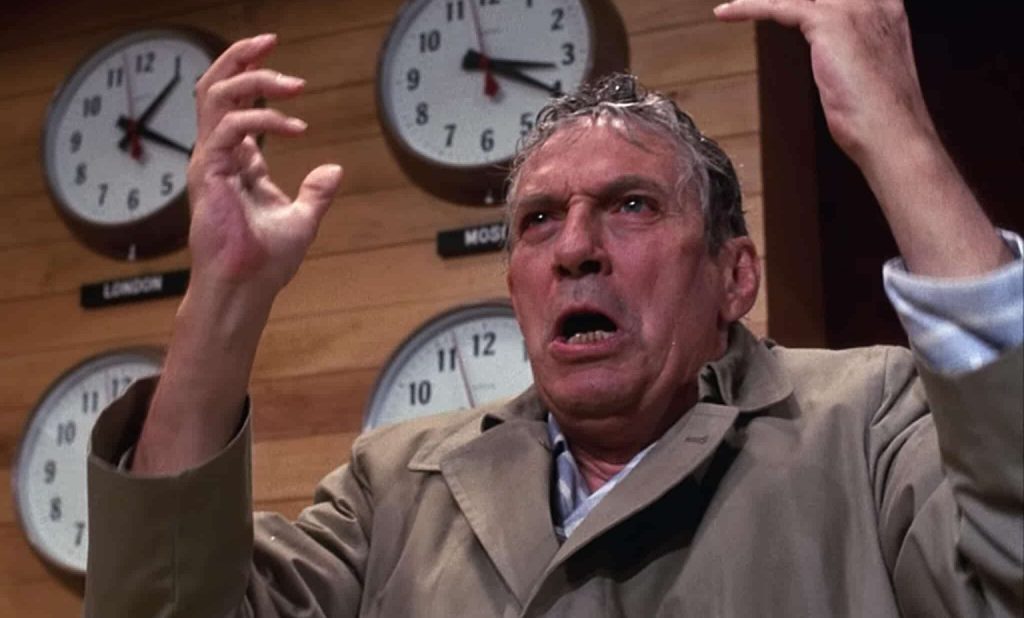
Where Network does falter slightly is in its overemphasis on William Holden and Faye Dunaway’s romantic side plot. It seems somewhat unnecessary to focus so much of the film on them and feels like a deviation from the main story in spite of the clear message it’s trying to convey. That of the generational differences between Holden’s decent family man and Dunaway’s fiercely driven but emotionally vacuous businesswoman. Beatrice Straight gives a brief but moving performance as the scorned wife to whom Holden confesses of his affair that got her a Best Supporting Actress Oscar. Holden too has a number of superb scenes but when has William Holden not delivered? He’s a brilliant actor and deserving of his Best Actor nomination. I found that there was little to like about Dunaway’s Diana Christensen, although I’m sure that’s wholly intentional and to see Holden calmly tell her some home truths at their parting after he finally sees the error of his ways only makes his character all the more likeable. Dunaway too was the recipient of an Oscar for Best Actress.
I feel that Network veered a step too far from the realms of believability in its latter half when the network show-runners broker a TV deal with a radical left wing terrorist group. For me the film should have maintained its focus on the rise of Beale from disenfranchised anchorman to a worshipped TV evangelist preaching his new religion of truth but too little of this is seen.
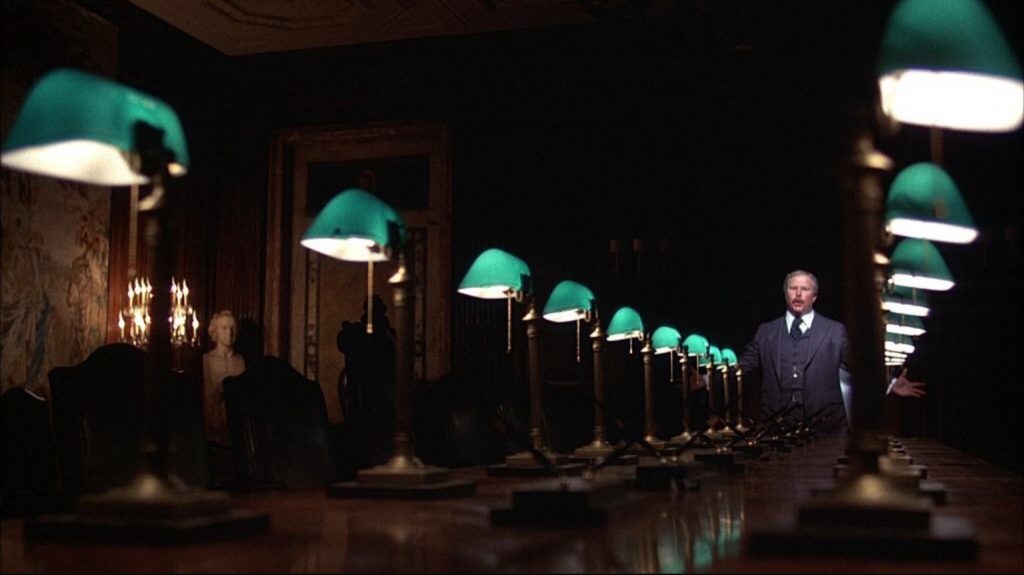
I’ve heard Network described as darkly funny which kind of baffles me as I’d never really describe it as a comedy. I found little if any of the film generated laughter yet I was fully aware of the deeply black satirical eye it casts upon the ruthless world of the media. Don’t expect the same sort of scathingly funny, socio-political satire as seen in the films of Paul Verhoeven or Kubrick’s Dr. Strangelove. Network‘s humour is far more subtle, so much so that it evaded my detection for the most part.
What Network does best is shine a holy light of truth upon the media. Late in the film, Arthur Jensen, played by Ned Beatty in a brief but important cameo, confirms what Beale has been preaching, that the world isn’t run by politics, values or opinions but by money, plain and simple. The corporations are god.
I went into Network expecting a film that would stand up to other similar media and celebrity satires such as Martin Scorsese’s The King of Comedy (1983), at least in terms of rewatch-ability. Whilst the first half of Network fizzles with the sheer electricity of its sharp script and the perverse wonderment of seeing Howard Beale’s apparent breakdown erupt on air, the latter half failed to maintain the same level of interest or build to any overtly satisfying conclusion. The attempt at a shock ending felt unnaturally abrupt and not in keeping with the tone the rest of the film had maintained. Where it seemed to weave subtle satire throughout the first two acts, by the third act, it’s satire became a little too overt and the bleak tone of the denouement almost felt like it was from another film.
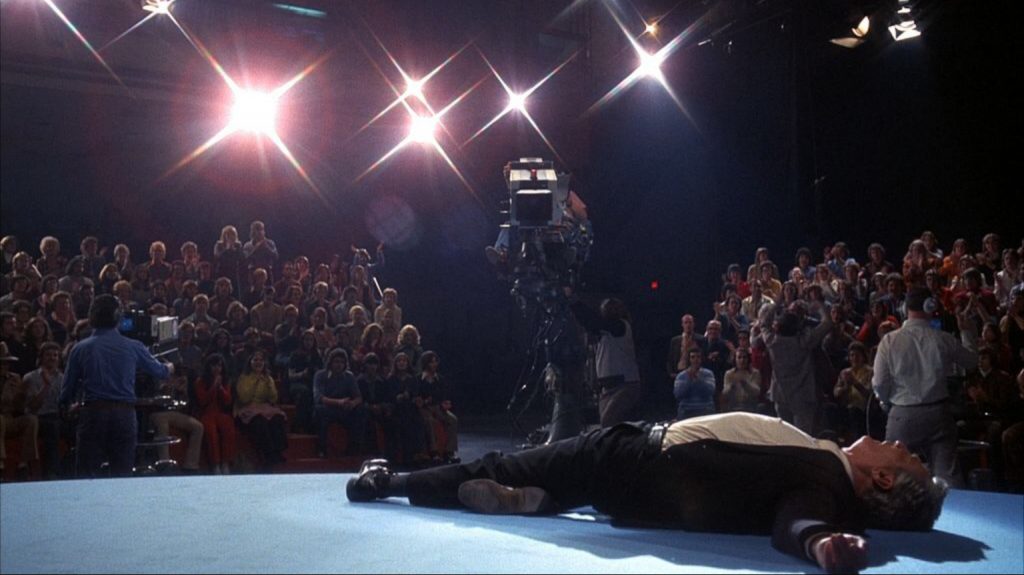
I know there’ll be longstanding fans of Network that decry my, albeit minor criticisms and I’m not saying that I didn’t like the film because I did enjoy it a great deal on this most recent rewatch, to a point. Holden and Finch are marvellous and although Dunaway’s character isn’t particularly endearing, her performance is still solid, albeit for me, a little short of Oscar worthy. The script, for the most part, features some very memorable and perfectly written attacks upon the media and the corporate savagery that would prevail in the decades to follow Network‘s release, and for those two aspects alone, the central performances of Holden and Finch and the great script, I’d happily recommend Network to those who haven’t seen it. It’s tonal issues may just be something personal to me, but as ever, I’m not going to veer from the truth of what a film does or doesn’t do for me, and the truth after all is what Howard Beale’s preaching was all about.
Film ‘89 Verdict – 8/10

